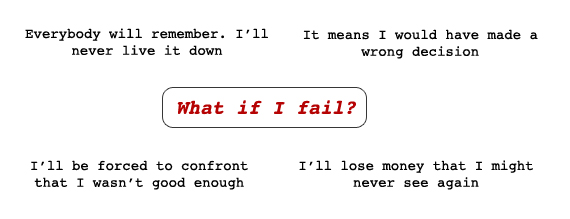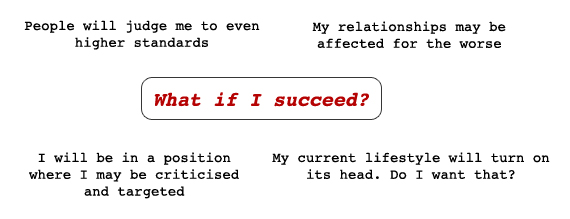The 2 Crippling Fears That Sabotage Your Affiliate Business
One of the best decisions I ever made was to stop looking for affiliate programs to promote and start thinking about products I could create.
Creating products is the logical progression from affiliate marketing.
Most affiliates arrive at the same conclusion, whether it takes 6 months or 6 years in the trenches, “Why promote somebody else’s million dollar idea when I am quite capable of concocting my own?”
It’s certainly not due to a lack of ability. A better diagnosis would be a lack of faith.
Many affiliates are scared to create.
There are two fears that hold us back. The fear of failure and the fear of success. I’m going to explain both, and what you can do to defeat them.
Why Affiliate Marketing is Easy… and Why Creating is Not
It would be denial to say that playing the lone shark affiliate doesn’t have its advantages.
There’s no such thing as a recession in affiliate marketing. Not when you can change industry in a heartbeat by pausing one campaign and unleashing another.
For much of the last three years, my relationship to affiliate offers could be described as ‘ships passing in the night’.
If product owners are the gigantic ocean cruisers with a fixed path from one coordinate (the land of messy whiteboards) to the next (the land of launched products), affiliates are the pirate ships that loiter in open waters, with no real direction, no real homeland, just a desire to pillage whatever profits come their way.

There are many reasons why we prefer to stay in those open waters.
The idea of travelling from A (the whiteboard of ideas) to B (the launched product) requires discipline and planning; a sense of direction.
Procrastination feels less criminal when your work requires that you drift aimlessly. We are reactors to opportunity, but rarely the architects.
There are no passengers (aka customers or investors) to satisfy when you don’t claim to be going anywhere fast.
Some affiliates are quite happy to operate as Chief Arbitragers of the High Seas.
Most are not.
It’s the nature of any businessman to wish for a sense of direction. We all love the feel-good buzz that a satisfied customer brings, and the idea that someday we might just dock our ships on dry land (sticking our flags in the humble turf of stable profits)
I don’t care what anybody says. Operating on the open seas, as a CPA affiliate marketer does, with virtually no control over the fate of his vessel, is a recipe for severe seasickness. It’s not just the lack of direction that grates us. It’s the uncertainty. Affiliate businesses are prone to go missing in the night, victims of icebergs that were seen too late.
And those of us who have being doing this shit for too long – surviving in limbo, rich but rudderless – know exactly how harmful the resulting sea scurvy can be. Drifting aimlessly affects all parts of our lives: the social isolation, the blood pressure readings, our physical health and mental well-being.
When you have nowhere to be, and nobody to please, you really can drift aimlessly for months, even years.
Some might call that a life of freedom.
When you look beyond the brash talk of being one’s own man, I often find that affiliates are hesitant to create because they lack confidence.
They are paralysed by our two recurring fears:
- The fear of failure
- The fear of success
These fears are the twin terrors of procrastination.
The Fear of Failure

Fear of failure is most likely to arise from low self-confidence, anxiety, and perfectionism.
What stops you from launching that ambitious Facebook campaign? Or that exciting new website?
All too often, perfectionism stops us from creating.
If we accept nothing less than número uno in our industry of choice (and let’s face it, that’s usually the target during initial brainstorming), is it any wonder that we are hesitant to get started? Our expectations are so high.
Time and time again, I see affiliates drowning in information paralysis. How many blogs, ebooks and forums have you read in search of the ‘perfect’ formula?
Why do you do this?
It is usually because we believe that reading enough opinion pieces, and uncovering enough anecdotal evidence, will lower our chances of failure.
Often, the reason we don’t just get shit done and launch that ambitious Facebook campaign is because we are scared of failing; scared of making a wrong decision that could have been avoided with X hours of research.
Those fears are compounded by the fact that so much of online marketing requires investment of both time and money.
The same applies to creating products and launching new websites.
We would rather dither and procrastinate, killing the idea through a lack of action, than throw all our resources in to a project that stands a chance of failing. At least that way we are in control of how and why it fails.
We somehow feel smarter by not confronting our potential. “Well, I know I could have crushed that weight loss campaign for $1000/day, but I certainly didn’t lose any money by not trying!”
This fear has certainly haunted me in the past.
I have found myself stalling on projects for weeks in search of the perfect WordPress theme, or the perfect logo. What looks like procrastination is actually a superficial sign that you have underlying concerns about the project, and/or your ability to deal with its success or failure.
But is it a logical fear?
Most of us know that creating products and services of genuine value is the way forward in 2012. Where I believe we shoot ourselves in the balls is our interpretation of ‘genuine value’.
Genuine value does not have to mean perfection.
I get a lot of people contacting me with fears of creating products and services on the basis that they can’t do a good enough job. Perhaps they aren’t great writers, or great speakers, or they don’t have enough time, or they don’t know what to create.
In nearly all cases, it comes down to:
a) A lack of confidence
b) An obsession with perfectionism that paralyses us from just getting started
My Experience Creating Products
Before I launched Volume 1 in my Premium Post series, I was more than a little apprehensive about the reception it would get.
A number of thoughts crossed my mind:
- What if readers reject the idea of paying money for my work?
- What if the material doesn’t live up to their expectations?
- What if customers slag off my products over Twitter and Facebook?
- What if I disappoint?
There is no doubt about it. Launching a product with your name on the cover is a personal experience, whether it gets credited to the company account or not.
My biggest fear was that the product wouldn’t be good enough. This manifested itself in to all parts of my work day. Instead of steaming ahead, I found a myriad of ways to keep my feet in the sand.
I didn’t want to make any wrong decisions, so I made none.
How to Overcome the Fear of Failure
Let’s say you want to get over that fear of failure. You want to stop procrastinating and start making some empowering decisions (like “I’m going to create my own product!“), and then actually following them through.
Where do you start?
Given that perfectionism is so closely tied to our procrastination, the first step is to accept that our self worth is not dependent on a single task, project or affiliate campaign.
If your identity is built around the idea that nothing less than perfection will do, there’s only one way you can hold yourself to such high standards: by giving the world no output to judge you by. By doing nothing.
Similarly, if like many affiliate marketers you view yourself as a “self-made entrepreneur, aka the boss“, it’s likely that you will feel great anxiety over the success of a project. It is what defines you as a person.
When Dedication Harms Your Work…
Imagine the unkempt hermit who lives, works and sleeps in his mother’s basement.
His identity is built around succeeding as an online marketer, and he spends every moment projecting that image to the world – on forums, on Facebook, to friends and family.
These individuals, ironically, are some of the most likely to procrastinate – to delay putting their stamp on the world. It is their stamp that defines their sense of value as a person.
The hermit’s self-esteem has become so dependent on his online success that every project is critical. If it fails, then it means he has failed as a person.
When entrepreneurism becomes such an integral part of your self-image, the pressure to do it well increases to an intolerable level. Sooner or later, you find yourself wasting time. You would rather shy away from the creation process than give the world something less than perfect to judge you by.
Procrastination hides your stamp from the world.
Many affiliates are deeply proud of their self-made roots, and with that pride comes a self-assessment that is typically counter productive: “My work reflects my worth”
How do you avoid the plague of perfectionism?
The most famous method is to ‘diversify your self-worth’.
If your self-esteem is driven by more than just business success, you will have better supports when it comes to taking risks and handling stress. You can deal with a failed venture because it is not the assassination of your value to the world.
Diversifying your self-worth could mean many things:
- Leading a rich social life and enjoying the company of your friends
- Being a good father or mother
- Being a good daughter or son
- Learning a new skill and putting it to good use
- Volunteering and helping the less able
- Doing a good deed every day
- Making an effort with strangers
When you establish a self-image that is balanced – one that does not depend on the success of your online business – you will reduce your fear of failure. You will spend less time procrastinating, and less time ‘grinding’ against your will.
Ironically, the best way to gain the confidence for new and challenging projects is to disconnect completely. Build your self-esteem and focus less on work. You will soon notice that work makes you less anxious, and therefore more productive.
The Fear of Success

Perhaps an even greater burden to productivity is the omnipresent fear of success.
Many entrepreneurs refuse to accept that their professional stagnation could have anything to do with the fear of success. I think it often has everything to do with it.
Consider these scenarios:
Scenario 1:
John Doe wants to launch a new male fitness website promoting a supplement product. He writes a few useful articles and gets a slow trickle of traffic. As much as he enjoys the initial response and the buzz of his first sale, he soon realises that success is going to take a large commitment of time. John’s friends are already badgering him about his refusal to come out on Friday night – he wonders where he would find such time. John browses his rival’s site and is deflated by the amount of content they produce. He can’t imagine that he would ever manage to replicate the effort, and he worries what effect trying might have on his relationships with family and friends. Instead of producing more content, John slowly disengages from the project feeling. He feels inferior to his rivals (who all have larger budgets and better writers). An advertiser emails John offering to buy banner space for a nice monthly sum but John is now so paralysed at the gulf between his current site and the imaginary site in his head that it feels like enslavement. The prospect of committing to the project is seen as a threat to his lackadaisical lifestyle. He ignores the email, distances himself from the site, and meets his friends on the next Friday night.
Scenario 2:
Jane Doe runs a successful forum for Work at Home Moms and has attracted a large number of dedicated followers. As her fame has grown, the demand for her brand has grown too. She has companies offering to pay her generously for speaking appearances, and one large firm is even willing to double her monthly income by hiring her on a part-time consulting basis. Jane loves her forum, appreciates her members, but fears she couldn’t possibly balance the forum with the new better-paying work. She relies on those friends to help her through motherhood. Instead of seizing the opportunity to advance her career, she rejects the speaking proposals, ignores the consultancy offers, and sticks to what she knows best.
It’s not just failing that scares us.
There’s the thought of what might happen if we actually succeed.
The fear of success is most likely to materialise in those who lack the confidence to test themselves outside their comfort zone. It is also apparent in online marketers who have grown too accustomed to the life of home comforts.
Many of us are guilty of dithering on projects where success has the potential to coax us out of our rabbit holes, and god forbid, in to the real world of meeting rooms and ‘deliverables‘.
Affiliates are terrified to create products because:
a) Succeeding could represent a leap away from anonymously fingering their balls in the basement while reporting to nobody.
b) Failing would be… failing. And many affiliates take that as a damning verdict on their self-worth.
Success is a threat to the easy-going affiliate lifestyle, which creates a subconscious anxiety projected to the world by our endless procrastination.
One of my favourite analogies sums up the resistance perfectly; “Success is like an escalator. Once you get on, there’s no place to get off except at the top.”
When you jump on the first step, when you take that leap of faith, you worry that you might not be the same person if you succeed. The ‘successful you‘ comes attached to higher expectations, busier days, and eroded relationships with your family and friends.
It’s irrational – but maybe we are not as keen for success as we like to think?
Drifting aimlessly as an affiliate does, happily pillaging profits, ensures that we never have to jump on the escalator. We maintain full control over our lives, free from outside influence, our resistance ensured and typically masked as “freedom to do what we like!“.
What we sometimes neglect is that the freedom to work from home is no longer a freedom when you are too scared to leave the front door for fear that you might lose what is so comfortable. And predictable.
How to Overcome the Fear of Success
Behind the fear of success you will typically find a simple (and very damaging) learned belief; “I am not good enough.”
The source of this false belief varies from individual to individual. It could be the relic of an unstable childhood, a vicious relationship break-up, or a class that you flunked many years ago.
The bottom line is that without pinpointing what exactly you are afraid of, you will continue to procrastinate while digging your heels in the dirt.
LiveStrong has a good ‘troubleshooting’ technique that uses a lifestyle analysis to create self-affirming statements while pinpointing the source of your fears.
Self-affirming statements are used to encourage a growth mindset rather than a fixed mindset.
Fixed mindset: “I wish I could be a successful online marketer, but I’m useless with technology. I can’t code for shit.”
Growth Mindset: “To be a successful online marketer, I need to improve my understanding of technology. I’ll start by learning how to code.”
The Self-Affirming Statement: “I am a fast learner. I achieve whatever I put my mind to”
Fixed mindset individuals are terrified of the unknown, which is like being allergic to success.
Do you identify your skill-set as being a ‘part of you’? Or do you view it as ever-changing, ever-improving?
A fear of success – the apprehension about ‘leaving the nest’ – is nearly always traced back to self-affirming statements of negative origin, and a fixed mindset.
For the affiliate marketer, this might be a stubborn resistance to authority (“Working as a consultant goes against my principle of reporting to nobody!”), or it might be the deep-rooted discomfort that creating something means jumping on the success escalator. Once you’re on, you can’t get off.
Either way, you need to isolate the source of your anxiety and resistance. Once you have found it, use self-affirming statements and small achievable goals.
You might not see a change straight away, but with a learned belief that says, “I am getting better“, the fear of success will slowly diminish.
The Action Plan
Can you relate to the twin terrors of failure and success? Have they affected your career decisions, or another part of your life?
If they have, here’s what to do next.
Diversify your Self-Worth – How do you want to be judged as a person? Many online marketers jump straight to the narrative that says “as a fine entrepreneur“. That’s great, but it makes for a pretty uninspiring tombstone. Choose at least two additional roles: be it as a good father, a good friend, a charitable leader, a skilled musician, a talented sportsman, and so on. Pay attention to these roles. Allow them to flourish by setting time aside that is of equal priority to work. Define your success as more than just a talented Internet swindler.
Identify Your Source of Anxiety – Are you scared of the effect success would have on your relationships? Do you resent the idea of losing your playboy affiliate lifestyle? Are you worried that people will judge you to a greater standard, one that makes life so much harder, if you dare to succeed? Identify where your anxiety stems from.
Adopt the Growth Mindset – Entrepreneurs in possession of the magic Growth Mindset are more successful than those with a Fixed Mindset. It’s important we learn to disassociate failure with an attack on our self-worth. Accept failure as a lesson learnt, and a chance to better yourself. Take on new challenges with the perspective of one step closer to success, not one more pie in the face.
Use Self-Affirming Statements – Once you have pinpointed your anxieties, use self-affirming statements to slowly mould your self-esteem by focusing on the positives. Make it a daily ritual until you actually believe them.
Recommended This Week:
- The Empire Strategy has become the bestselling volume in the Premium Posts series. I owe a major thank you to all of you who’ve snapped it up so far. If you haven’t read it yet, you can grab your copy here. Enjoy!







OH men where were you a few months ago. this article was describing my life as it is. thanks men…